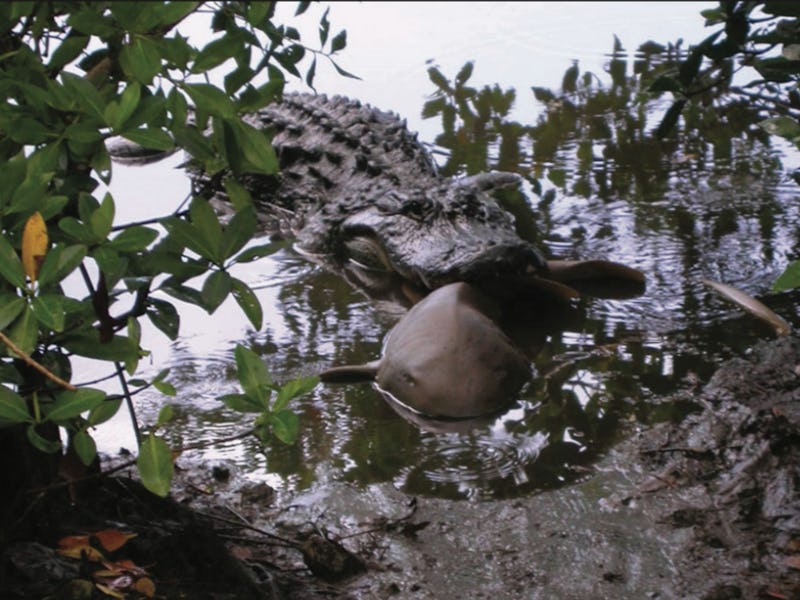Biologists Surprised by Unlikely Outcome of Alligator vs. Shark Showdown
The lesson: adapt or die.

As if we needed another reason to find alligators terrifying, scientists now have evidence that they eat sharks. That’s right. Sharks. You know, the big fish with sharp teeth.
Let that sink in: Species of the largest, scariest predators on Earth have been found inside the stomachs of one of the world’s other top predators. It’s not enough that alligators survived the mass extinction that killed the dinosaurs 65 million years ago. Now, they’re eating sharks and stingrays.
In the study described in the September issue of the journal Southeastern Naturalist, Kansas State University biologist James Nifong, Ph.D. and NASA Kennedy Space Center biologist Russell Lowers, Ph.D. came to their startling conclusions after reviewing existing observations and photos from other researchers.
They concluded that American alligators on the coasts of Florida and Georgia have eaten four members of the shark and stingray family, Elasmobranchii: Ginglymostoma cirratum (Nurse Shark), Sphyrna tiburo (Bonnethead Shark), Negaprion brevirostris (Lemon Shark), and Dasyatis sabina (Atlantic Stingray). While the alligators in question appear mature, they aren’t necessarily monstrous.
Here’s a large male gator going HAM on a bonnethead shark:
This American alligator was seen on camera "capturing (top-left), manipu- lating (top-right and bottom-left), and consuming (bottom-right) an adult Bonnethead Shark in salt marsh near St. Marks, FL."
In a few cases, the authors found evidence of alligators eating nurse sharks and rays, which are admittedly not the most vicious prey. But bonnethead sharks, which can grow to five feet long, aren’t exactly weak foes. Even more surprisingly, they also found evidence of alligators eating lemon sharks, which can grow to more than 10 feet long.
It may sound strange that alligators, which live in fresh water, share habitats with sharks. But the researchers say it’s actually pretty common to see these toothsome predators inhabiting the same water, at least for short periods of time.
“Alligators seek out fresh water in high-salinity environments,” Nifong said in a statement. “When it rains really hard, they can actually sip fresh water off the surface of the salt water. That can prolong the time they can stay in a saltwater environment.” If you’ve read this far, that shouldn’t be surprising. Alligators are survivors.
This alligator caught a nurse shark, a relatively small, non-aggressive shark, in a mangrove swamp in Florida.
A couple of factors have made it hard for scientists to study what alligators eat. The first, of course, is their size: It’s hard to hold a big alligator still enough to pump its stomach, the researchers write, and all previous research has focused on smaller gators that are more likely to eat crabs, birds, and small mammals. The second challenge is their high stomach acidity. Even if you could pump a big gator’s stomach, the acid in it measures 2 or lower on the pH scale — human stomach pH is anywhere between 1.5 and 3 — so any cartilage from an ingested elasmobranch would be quickly digested.
Researchers caught this alligator after it chomped down on an Atlantic stingray.
This research confirms old, often questionable reports of alligators eating sharks, including one the researchers cited, in which 500 alligators that brawled it out in a lagoon with a bunch of sharks in the 1800s in the 1800s. The authors hope their work will shed light on the interactions among these large predators in order to better understand the impact that species abundance has on ecosystem as a whole as a whole.
If you liked this article, check out this video of chickens with dinosaur noses.